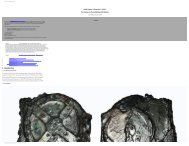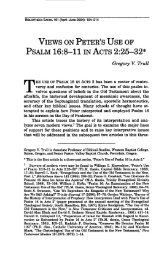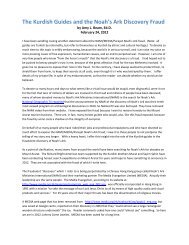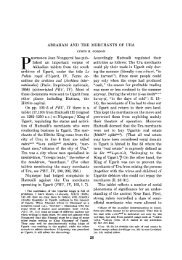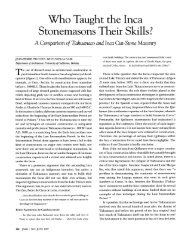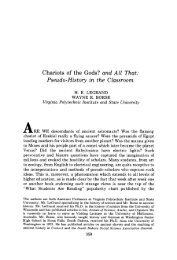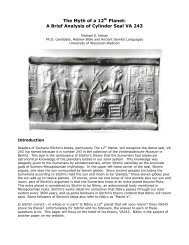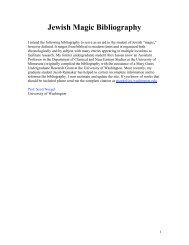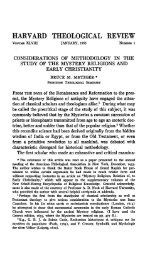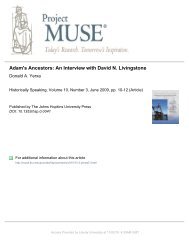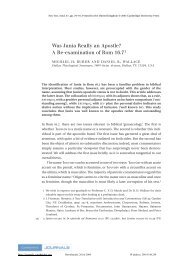Paul's Argument from Nature for the Veil in - Michael S. Heiser
Paul's Argument from Nature for the Veil in - Michael S. Heiser
Paul's Argument from Nature for the Veil in - Michael S. Heiser
You also want an ePaper? Increase the reach of your titles
YUMPU automatically turns print PDFs into web optimized ePapers that Google loves.
80<br />
Journal of Biblical Literature<br />
<strong>the</strong> scent of <strong>the</strong> suppository. If he smells <strong>the</strong> scent, he diagnoses her as fertile. If<br />
he does not smell <strong>the</strong> scent, he concludes she is sterile because <strong>the</strong> channels<br />
connect<strong>in</strong>g her uterus to her head are blocked. The suction power of her hair<br />
cannot draw up <strong>the</strong> semen through <strong>the</strong> appropriate channels <strong>in</strong> her body. The<br />
male seed is <strong>the</strong>re<strong>for</strong>e discharged ra<strong>the</strong>r than reta<strong>in</strong>ed, and <strong>the</strong> woman cannot<br />
conceive.<br />
Aristophanes (Eccl. 523–24) plays on this Hippocratic test <strong>in</strong> <strong>the</strong> scene<br />
where Blepyrus accuses his wife Praxagora of sexual unfaithfulness dur<strong>in</strong>g her<br />
clandest<strong>in</strong>e early-morn<strong>in</strong>g excursion. She denies <strong>the</strong> accusation and <strong>in</strong>vites<br />
Blepyrus to test her fidelity by smell<strong>in</strong>g her head to see if she smells of <strong>the</strong><br />
sweet odor of semen <strong>from</strong> her head (eij th'/ kefalh'/ o[zw muvrou). 20 Blepyrus<br />
doubts <strong>the</strong> veracity of <strong>the</strong> test by <strong>in</strong>ferr<strong>in</strong>g that a woman can engage <strong>in</strong> <strong>in</strong>tercourse<br />
without scent. Praxagora’s response admits that some women can have<br />
<strong>in</strong>tercourse without <strong>the</strong> scent of semen <strong>from</strong> <strong>the</strong> head but she cannot. Of<br />
course, an <strong>in</strong>fertile woman could because <strong>the</strong> scent of semen would not be<br />
drawn to her head but a fertile woman could not. Fertile women who engage <strong>in</strong><br />
illicit <strong>in</strong>tercourse eat garlic to mask <strong>the</strong> scent (Aristophanes, Thesm. 492–94).<br />
Praxagora affirms both her fertility and her fidelity by <strong>in</strong>vit<strong>in</strong>g Blepyrus to smell<br />
her head. 21<br />
This conception of hair as part of <strong>the</strong> female genitalia also expla<strong>in</strong>s one of<br />
Soranus’s signs of conception. He uses <strong>the</strong> adjective frikwvdh" to describe <strong>the</strong><br />
20 Stephen Halliwell translates Praxagora’s test as “Why, smell my hair <strong>for</strong> trace of scent,” and<br />
Blepyrus’s response as “What? Can’t a woman be fucked without some scent?” (Aristophanes:<br />
Birds, Lysistrata, Assembly-Women, Wealth: A New Verse Translation with Introductions and<br />
Notes [Ox<strong>for</strong>d: Clarendon, 1997], 173). Aristophanes (Lys. 937–47) plays on <strong>the</strong> double mean<strong>in</strong>g of<br />
muvron as <strong>the</strong> scent of perfume and of semen <strong>in</strong> <strong>the</strong> exchange between Myrrh<strong>in</strong>e and K<strong>in</strong>esias, who<br />
is pressur<strong>in</strong>g her to satisfy his erection. She stalls by claim<strong>in</strong>g that <strong>the</strong>y need perfume (muvron) and<br />
asks, “Do you wish that I should perfume (murivsw) you?” He protests with an oath s<strong>in</strong>ce he should<br />
perfume her <strong>in</strong> <strong>the</strong> act of <strong>in</strong>tercourse ra<strong>the</strong>r than <strong>the</strong> o<strong>the</strong>r way around. He <strong>the</strong>n <strong>in</strong>terjects, “O that<br />
<strong>the</strong> perfume (muvron), Master Zeus, might stream out!” Of course, K<strong>in</strong>esias refers to his desired<br />
ejaculation. F<strong>in</strong>ally, he curses <strong>the</strong> man who first ref<strong>in</strong>ed (eJyhvsa") perfume (muvron). The verb e{yw<br />
means to boil and refers to <strong>the</strong> bodily function of froth<strong>in</strong>g bodily fluids. Hence, it often means to<br />
nurse, <strong>for</strong> milk is fro<strong>the</strong>d blood. Semen is also fro<strong>the</strong>d blood, and this verb refers both to <strong>the</strong> ref<strong>in</strong><strong>in</strong>g<br />
of perfume with fire and to <strong>the</strong> froth<strong>in</strong>g of semen <strong>in</strong> <strong>the</strong> male body. Throughout <strong>the</strong> exchange,<br />
<strong>the</strong>re<strong>for</strong>e, Aristophanes plays on <strong>the</strong> double mean<strong>in</strong>g of muvron as both perfume and semen. See<br />
also Plato (Resp. 398a), who stipulates that an effem<strong>in</strong>ate bard (Resp. 395d) be sent away <strong>from</strong> <strong>the</strong><br />
ideal city after hav<strong>in</strong>g myrrh poured down his head and after be<strong>in</strong>g crowned with fillets of wool.<br />
Both of <strong>the</strong>se actions symbolize <strong>the</strong> effem<strong>in</strong>ateness of <strong>the</strong> bard.<br />
21 R. G. Ussher expla<strong>in</strong>s this test <strong>from</strong> <strong>the</strong> common practice of a woman’s perfum<strong>in</strong>g be<strong>for</strong>e<br />
<strong>in</strong>tercourse (Aristophanes Ecclesiazusae: Edited with Introduction and Commentary [Ox<strong>for</strong>d:<br />
Ox<strong>for</strong>d University Press, 1973], 148). Perfum<strong>in</strong>g, however, expla<strong>in</strong>s nei<strong>the</strong>r Praxagora’s confidence<br />
<strong>in</strong> <strong>the</strong> test nor her <strong>in</strong>vitation to smell her head ra<strong>the</strong>r than o<strong>the</strong>r parts of her body that would have<br />
been perfumed. In contrast, <strong>the</strong> Hippocratic test expla<strong>in</strong>s both of <strong>the</strong>se features of <strong>the</strong> scene.



